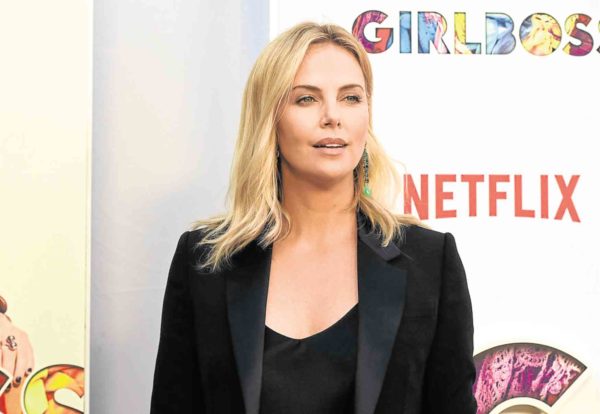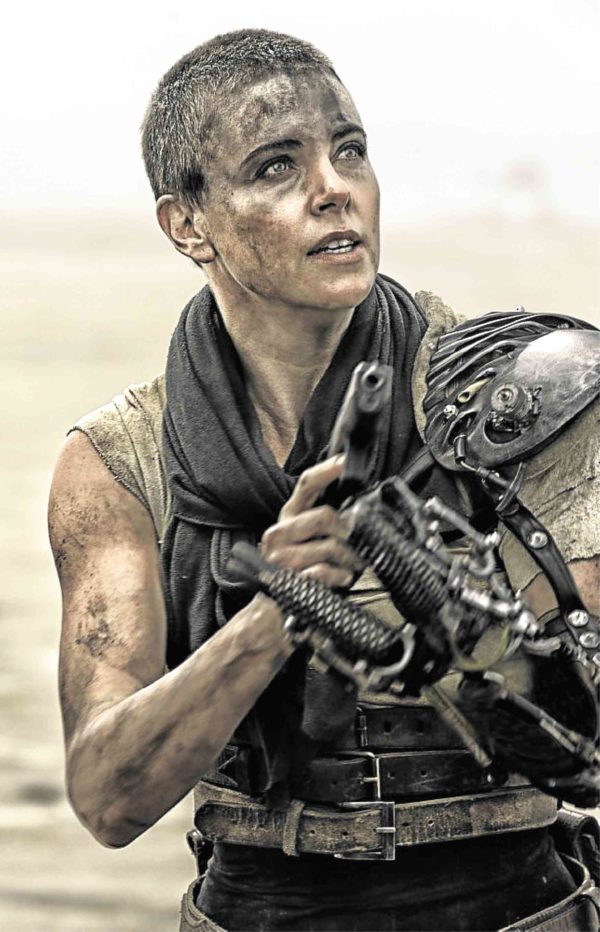
Charlize Theron
New York—The struggle for equality remains an uphill climb, even for women in Hollywood, who need to constantly fight against wage disparity or the scarcity of roles that don’t see them as merely decorative entities in testosterone-fueled film and TV productions.
Ask Charlize Theron (“Mad Max: Fury Road”), Angelina Jolie (“Maleficent”), Meryl Streep (“The Iron Lady”) and, more recently, Gal Gadot (“Wonder Woman”)—who are among few actresses who have successfully bucked Tinseltown’s age-old misogyny.
Theron’s experience producing the web series, “Girlboss,” is instructive in this regard. The show tells the true-to-life tale of how, at age 23, Sophia Amoruso was able to build her eBay store Nasty Gal from the ground up, selling vintage clothing.
Theron, who portrays one tough cookie Lorraine Broughton in David Leitch’s edgy actioner “Atomic Blonde,” received the novel that inspired the series as a gift, and something about its bright pink cover page immediately spoke to her.
“I had no idea what I was going to read,” she said at a panel discussion in New York to promote the series early this year. “It was the book’s little chapters on young adulthood that I found very amusing—and the young girl in me was envious of [Sophia] and wished that I read something like it when I was in my 20s. It sparked something in me. You see, I built a whole career on flawed and f**ked-up characters, and this [material] felt so incredibly layered.”
When asked how “Girlboss” ended up with Netflix, the discussion got even more fascinating.
Theron recalled, “We went to one other place to pitch this, but I won’t name the network. But, to give you an example, we sat in a room full of mostly men. It was creator Kay Cannon, coproducer Laverne McKinnon and me—and the feedback we got was absolutely shocking!
“When we walked out of it, there was this real sense of understanding that if we didn’t find the right home for this project, it would literally just disappear.

Theron in “Mad Max”
“I remember standing in the elevator and looking at Kay, who remained optimistic while I was looking like a depressed b*tch, you know? I said, ‘We’re not doing that.’ If we’re going to make this happen, let’s make the show we want to make—and, in unison, we said, ‘We have to go to Netflix.’ Let the show live in its authenticity and not let it be stifled.”
As it turned out, the male-dominated panel Theron and company initially pitched the show to was apparently “worried” about protagonist Sophia (portrayed by Britt Robertson)—but the Oscar-winning actress said that she’d been hearing their “concern” all throughout her career.
Theron mused, “I’ve heard this [excuse] many times in my career, where you’re told that people are going to find the character ‘too abrasive.’ ‘You have to make sure the audience likes her,’ they’d say—and I wonder how many times Robert de Niro heard that when he was doing ‘Taxi Driver.’ How many times did Jack Nicholson hear that when he was doing ‘The Shining’?
“There’s this war that you have to consistently wage so the audience could identify with the truth of what women are—our complexities, how layered we are, and how beautifully f**ked up we are.
“It’s [instances] where we show women in a very truthful manner that people relate to a story more. The days of living in the ‘Madonna-whore’ complex is gone. We’re not going to be just great hookers or great moms. We mess up, too. And, sometimes, even I have a foul mouth, as do some girls. No more slut-shaming. You want to see a little bit of yourself [in what you watch].”
So, were there none of those “limitations” after they snagged the deal with Netflix?
Theron shook her head as she replied, “We never had a moment where we were told to change the language, or make Sophia not sit with her legs open. Nothing was holding us back to explore as much of her truth and condition. [It is to our advantage that] we have an actress like Britt. It’s like, we have a ‘gold mine’ in our hands, so you can [go to town] exploring all of those issues, because this girl is stupidly talented. It’s like, I f**king hate her! (Laughs)
“Seriously, it’s just pure envy [on my part]. Britt is truly the anchor of the show. There’s honesty about her as an actor that bleeds through her characterization. You can’t take your eyes off her!
“I’m inspired by the younger generation of actresses. When I started in this industry, a lot of us young actresses at the time were girlfriends or trophy wives—and I felt I had to try to create—to make wine out of water!
“We were at the mercy of the opportunities handed to us. It wasn’t until good opportunities were given to me that I was ready for them.
“But I feel like this generation is changing … that I’m inspired to, in some way, be a part of that—whether that means developing good material and trying to get it made.
“Nowadays, there’s storytelling available to us in which women are at the center of it. So, if anything, I feel that the younger generation is inspiring me to stay on top of my game.”
When asked what it meant to be a “girlboss” these days, Charlize replied: “I’m a true believer that the future is female. When you look at the world in its entirety, the idea that we’re more than half of the population, yet we are treated as second-class citizens, is unfortunate.
“There’s something so powerful and unstoppable about young girls being told that they can do anything. It’s an incredibly powerful moment for women, and we are at the cusp of it. We need to realize it’s in our hands to take ownership of that. We’re standing up in our own shoes—and we’re done just talking about it!”

